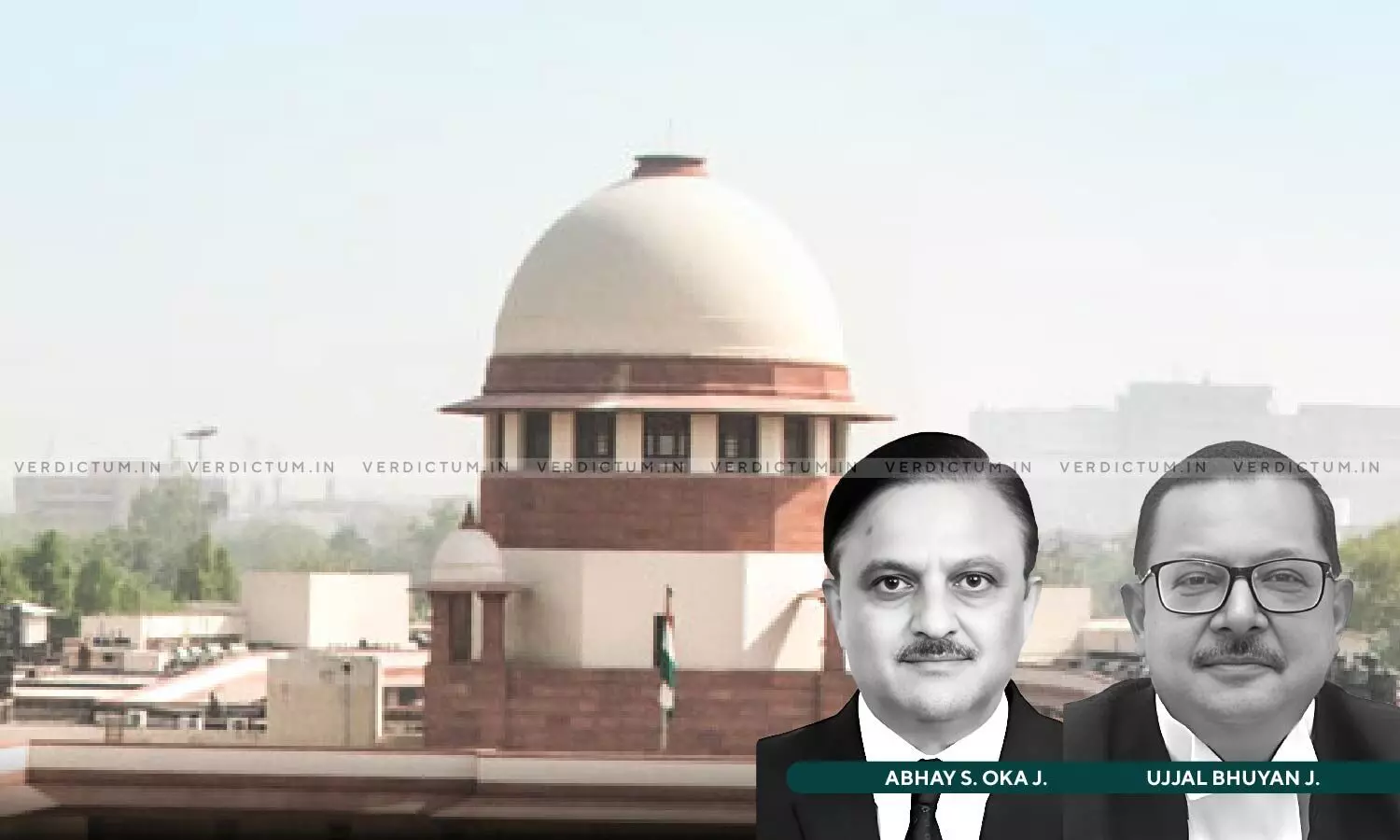
Justice Abhay S. Oka, Justice Ujjal Bhuyan, Supreme Court
Mere Endorsement By Superintendent On Returns Cannot Make An Assessment Provisional: Supreme Court Sets Aside CESTAT’s Order
 |
|The Supreme Court allowed three Civil Appeals filed under Section 35L(b) of the Central Excise Act, 1944 against the Order of the CESTAT.
The Supreme Court observed that mere endorsement by the Superintendent on the returns cannot make an assessment provisional.
The Court observed thus in three Civil Appeals filed under Section 35L(b) of the Central Excise Act, 1944 against the Order of the Customs, Excise and Service Tax Appellate Tribunal (CESTAT), West Zonal Bench at Mumbai.
The two-Judge Bench of Justice Abhay S. Oka and Justice Ujjal Bhuyan held, “In any case, there is no basis for the CESTAT to hold that assessments in respect of the products Benzene and Toluene for the months of January and February, 1993 were provisional. Only the order dated 18.10.1993 was available but it could not have had retrospective effect. Moreover, the essential requirements of Rule 9B were not complied with. There is no order of the proper officer under Rule 9B directing that assessments for the months of January and February, 1993 for the two products Benzene and Toluene were provisional. Neither any bond in proper format was directed nor executed by the appellant. Mere endorsement by the concerned Superintendent on two RT-12 returns cannot make an assessment provisional.”
AOR Neelam Sharma represented the Appellant while AOR Mukesh Kumar Maroria represented the Respondent.
Facts of the Case
The Appellant was a manufacturer of excisable goods falling under Chapters 27, 28, 29, 32, 38, and 39 of the Central Excise Tariff Act, 1985. It had filed classification list for various excisable products manufactured by it in terms of 73B of the Central Excise Rules, 1944. This classification was approved by the Assistant Collector of Central Excise. Thereafter, the Department drew samples of Benzene Toluene from the Appellant for chemical testing and the chemical analysis revealed that the purity of the two products was less than 96%, thus warranting classification under heading 2707.10 and 2707.20 respectively. The department approached the Collector which allowed its Appeal. The CESTAT dismissed the Appeals of the Appellant company and partly allowed the Appeal of the Respondent-Commissioner of Central Excise, Mumbai-II.
The differential duty demand in respect of the two products Benzene and Toluene for the period September, 1990 to December, 1992 amounting to Rs. 1,97,17,015/- and for the period January and February, 1993 of Rs. 18,16,304/- were upheld. In respect of the said two products, the CESTAT also held that contents of the test reports on the basis of which tariff classification of the products were changed leading to higher duty and hence differential duty were duly communicated to the Appellant. CESTAT also held that the assessments covering the said period were not provisional except for the months of January and February, 1993. The Supreme Court had condoned the delay in filing of the Appeals and had issued notice.
Reasoning
The Supreme Court in view of the above facts, remarked, “We are afraid we cannot subscribe to such sweeping generalizations made by CESTAT. There is no dispute that the test reports formed the basis for re-classification of the two products Benzene and Toluene. Department had entirely relied upon the test reports to alter the classification from 2902.00 to 2707.10 and 2707.20, thereby necessitating a higher duty demand resulting in levy of differential duty demand. Therefore, principles of natural justice required that copies of such test reports ought to have been furnished to the appellant.”
The Court said that informing the Appellant only the gist of the test reports cannot be said to be in compliance with the principles of natural justice as the test reports formed the sub-stratum of higher duty demand raised by the department thus entailing adverse civil consequences on the Appellant.
“It is axiomatic that documents relied upon by the authority to take a view different from the one existing and which would have adverse civil consequences upon the affected party should be furnished to the affected party. Otherwise, it will be a clear case of breach of the principles of natural justice”, it added.
The Court further noted that the assessments which were regular till December, 1992 could become provisional from January, 1993 and that the CESTAT rightly held that assessments for the period from September, 1990 to December, 1992 were regular but inexplicably held that assessments for the months of January and February, 1993 qua the products Benzene and Toluene were provisional.
“Such findings of CESTAT cannot be sustained. … We are, therefore, of the considered opinion that the appeals filed by the appellant are liable to be allowed”, it concluded.
Accordingly, the Apex Court allowed the Appeals and set aside the CESTAT’s Order.
Cause Title- M/s Oswal Petrochemicals Ltd. v. Commissioner of Central Excise, Mumbai - II (Neutral Citation: 2025 INSC 578)
Appearance:
Appellant: AOR Neelam Sharma, Advocates A.K. Prasad, Surabhi Sinha, Pankhuri Shrivastava, Alekshendra Sharma, and Aditya Kumar.
Respondent: AORs Mukesh Kumar Maroria and G.S. Makker.